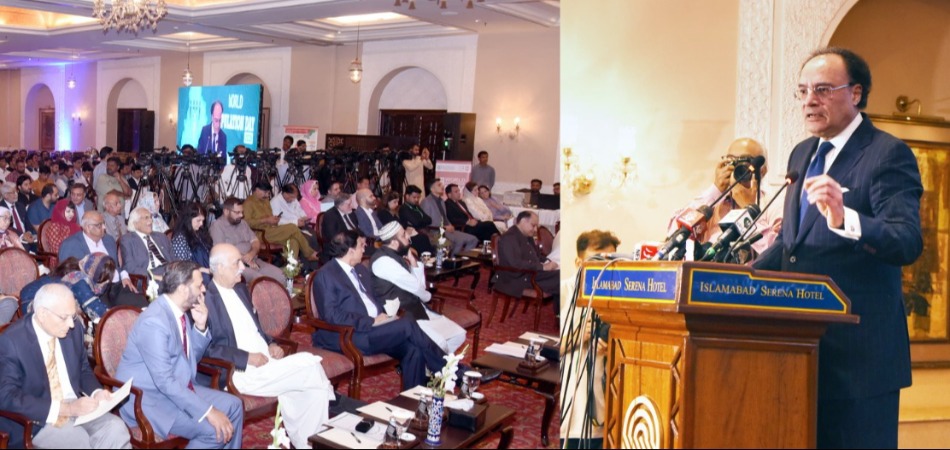Losing the plot on economy

MG News | December 14, 2021 at 09:53 AM GMT+05:00
December 14, 2021 (MLN): Managing Pakistan’s economy is not an easy affair by any stretch of the imagination. Finance ministers and central bank governors in the past have struggled to run affairs in an order that benefit all stakeholders (businesses, common man) and that is sustainable in the long term.
Finding the middle ground between the political urge to announce pro-growth policies and the International Monetary Fund recommended reforms (almost a regular affair for each government now) can be tough for anyone. So, when Adviser to Prime Minister on Finance and Revenue Shaukat Tarin appears on the national television to assuage the market’s concerns, he is finding it increasingly difficult to stitch a narrative.
Take his stance on the rupee’s depreciation during a recent interview on a local news channel for example. Labelling commercial banks as a mafia behind the rupee’s decline against the greenback, he said the local currency’s fair value against the greenback is 169 and it should revert to this level. Meanwhile, on Friday last week, the rupee closed at 178.90 at the open market. The Finance minister’s erratic claims on the rupee’s fall and its value have become a laughingstock among market participants who are now questioning his ability to do the job as country’s top man on the economy.
Calling banks, a mafia trying to sabotage the currency at a time when demand for dollars hit an all-time high (due to record imports) does not only erode Tarin’s goodwill but also eats away at the trust between government and markets. But market participants are shrewd. Their understanding of the economy is not driven by political priorities but by practical realities that are influencing the macroeconomic indicators.
Shoukat Tarin’s predecessor Dr Abdul Hafeez Shaikh’s narrative on the economy was relatively clear: reforms through tough actions. But just as he was replaced with Tarin, so was the narrative. Suddenly, the monetary and fiscal policies looked at supporting the flailing economy trying to undo the impacts of Covid-19 led slowdown through various tools i.e., policy rate cuts, fiscal stimulus etc. That adrenaline shot to the economy worked because of the sheer size of it. But just as the ball started to roll, the perennial problem of the current account deficit began to rear its head (a regular occurrence in Pakistan just as GDP growth crosses the 3-4% mark). The government was forced to pull the handbrakes of a whizzing economy. What followed were restrictions on imports and a sharp policy rate hike to curtail overall demand.
Beyond the fiscal realms, the leadership at the central bank also needs to be held accountable. Ever since the interest rates were increased suddenly in preponed November monetary policy meeting, the SBP has gone into a public relations offensive. But that too has fallen flat on its face. On one hand, it released clarifications on newspaper editorials calling them ‘biased’ whereas, on the other hand, the institution’s own governor and deputy governor were seen writing lengthy opinions themselves in newspapers explaining the merits of a rate hike. These actions are not only unnecessary especially keeping in view the role central bank plays in the economy, but they also add noise to the communication from the SBP.
In retrospect, one can easily say that the Ministry of Finance and the State Bank of Pakistan were both complacent to tackle the economic problems we are seeing now. Their reactions were too late, to say the least. The sudden jump in import numbers and CPI inflation during November and the preponing of monetary policy tell a sorry tale of economic affairs in the country. To think that the MoF and SBP were both blindsided by the inflationary trends and the impact of international commodity prices on imports is extremely problematic. Not only does it expose the economy to sudden shocks, but it also lays bare the incompetence of those in charge of running the affairs.
November’s import bill is a compelling argument for how badly things are being managed at the top. Reviewing Tarin’s statements and comments in September, one can easily sense the government’s itch to curtail imports as the current account deficit was widening to alarming levels by October. He even once said the government will ban imports of cars or increase duties etc. And like in any market, participants acted accordingly.
They started importing two to three months’ worth of items in advance leading to a record-high trade deficit in November.
Even though there is no denying that challenges on the economic front are manifold, the way those are being dealt with by the government leadership at the MoF and SBP is not building any confidence in the market. The decisions such as cutting down imports, jumping policy rate by 150bps in one go are not only reactive but also poorly coordinated.
Today, as we wait for monetary policy announcement from the SBP, any communication from the central bank needs to instil some confidence into the market for the short-to-medium term.
It would do government good to introduce a change at the top and control the narrative better through efficient communication instead of rebuttals, op-eds and wayward comparisons to other countries’ indicators. It would also be wise for those at the helm of fiscal and monetary policy to let everyone do their jobs and concentrate on how they can bring meaningful change in the economy instead of self-aggrandizement which is best left to politicians.
Copyright Mettis Link News
Related News
| Name | Price/Vol | %Chg/NChg |
|---|---|---|
| KSE100 | 134,299.77 290.06M |
0.39% 517.42 |
| ALLSHR | 84,018.16 764.12M |
0.48% 402.35 |
| KSE30 | 40,814.29 132.59M |
0.33% 132.52 |
| KMI30 | 192,589.16 116.24M |
0.49% 948.28 |
| KMIALLSHR | 56,072.25 387.69M |
0.32% 180.74 |
| BKTi | 36,971.75 19.46M |
-0.05% -16.94 |
| OGTi | 28,240.28 6.19M |
0.21% 58.78 |
| Symbol | Bid/Ask | High/Low |
|---|
| Name | Last | High/Low | Chg/%Chg |
|---|---|---|---|
| BITCOIN FUTURES | 118,140.00 | 119,450.00 115,635.00 |
4270.00 3.75% |
| BRENT CRUDE | 70.63 | 70.71 68.55 |
1.99 2.90% |
| RICHARDS BAY COAL MONTHLY | 97.50 | 0.00 0.00 |
1.10 1.14% |
| ROTTERDAM COAL MONTHLY | 108.75 | 108.75 108.75 |
0.40 0.37% |
| USD RBD PALM OLEIN | 998.50 | 998.50 998.50 |
0.00 0.00% |
| CRUDE OIL - WTI | 68.75 | 68.77 66.50 |
2.18 3.27% |
| SUGAR #11 WORLD | 16.56 | 16.60 16.20 |
0.30 1.85% |
Chart of the Day
Latest News
Top 5 things to watch in this week
Pakistan Stock Movers
| Name | Last | Chg/%Chg |
|---|
| Name | Last | Chg/%Chg |
|---|




 MTB Auction
MTB Auction